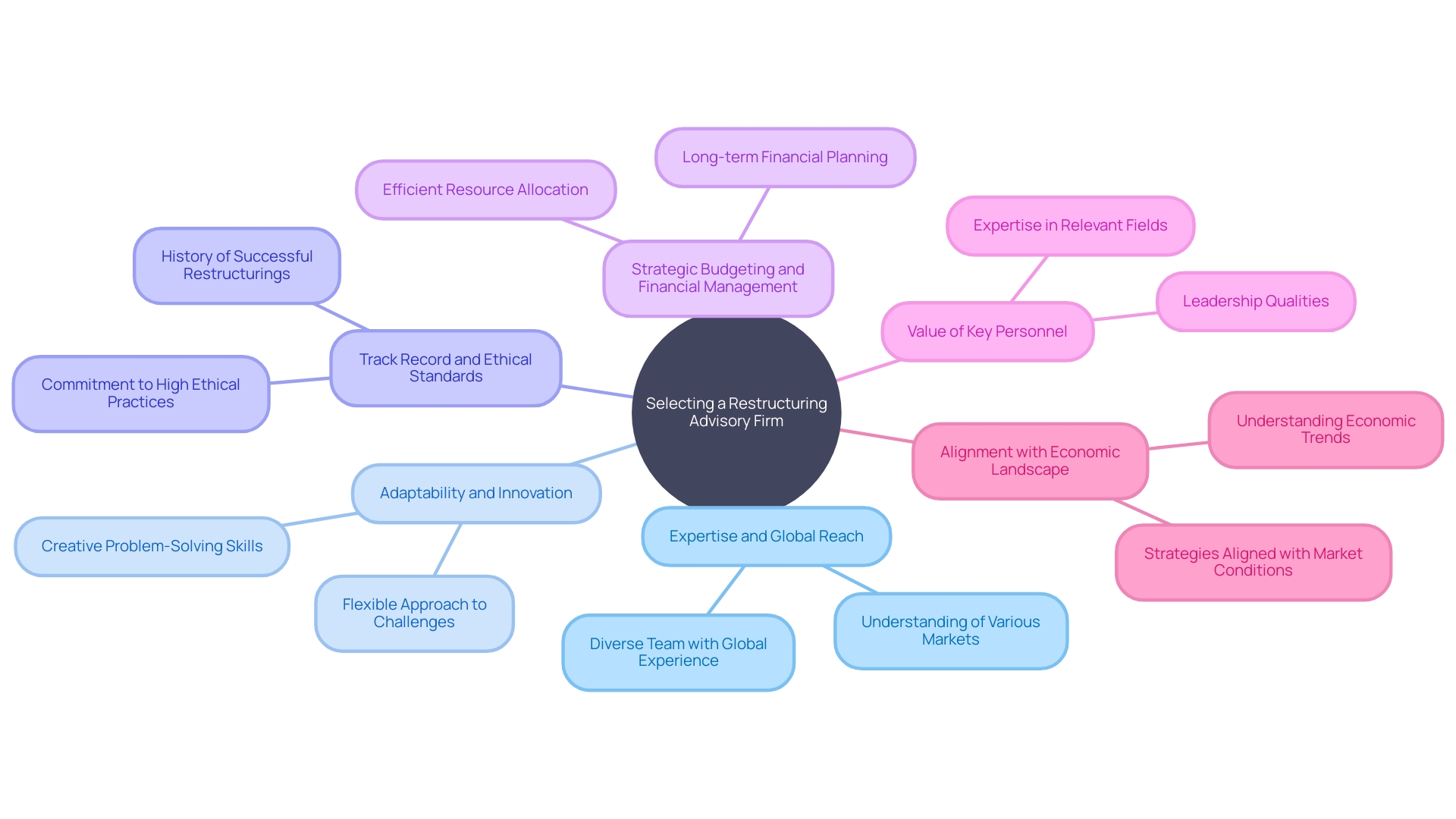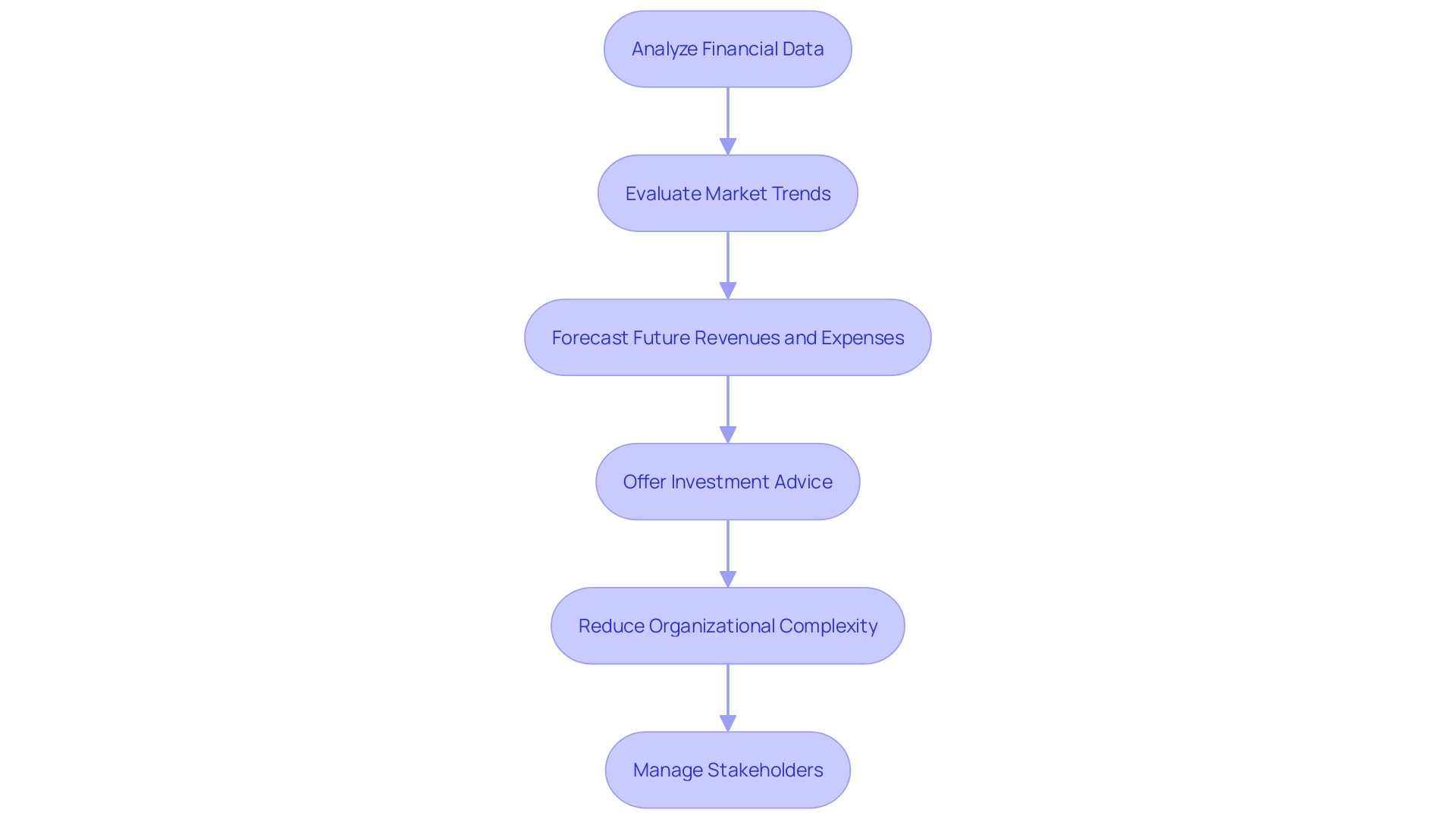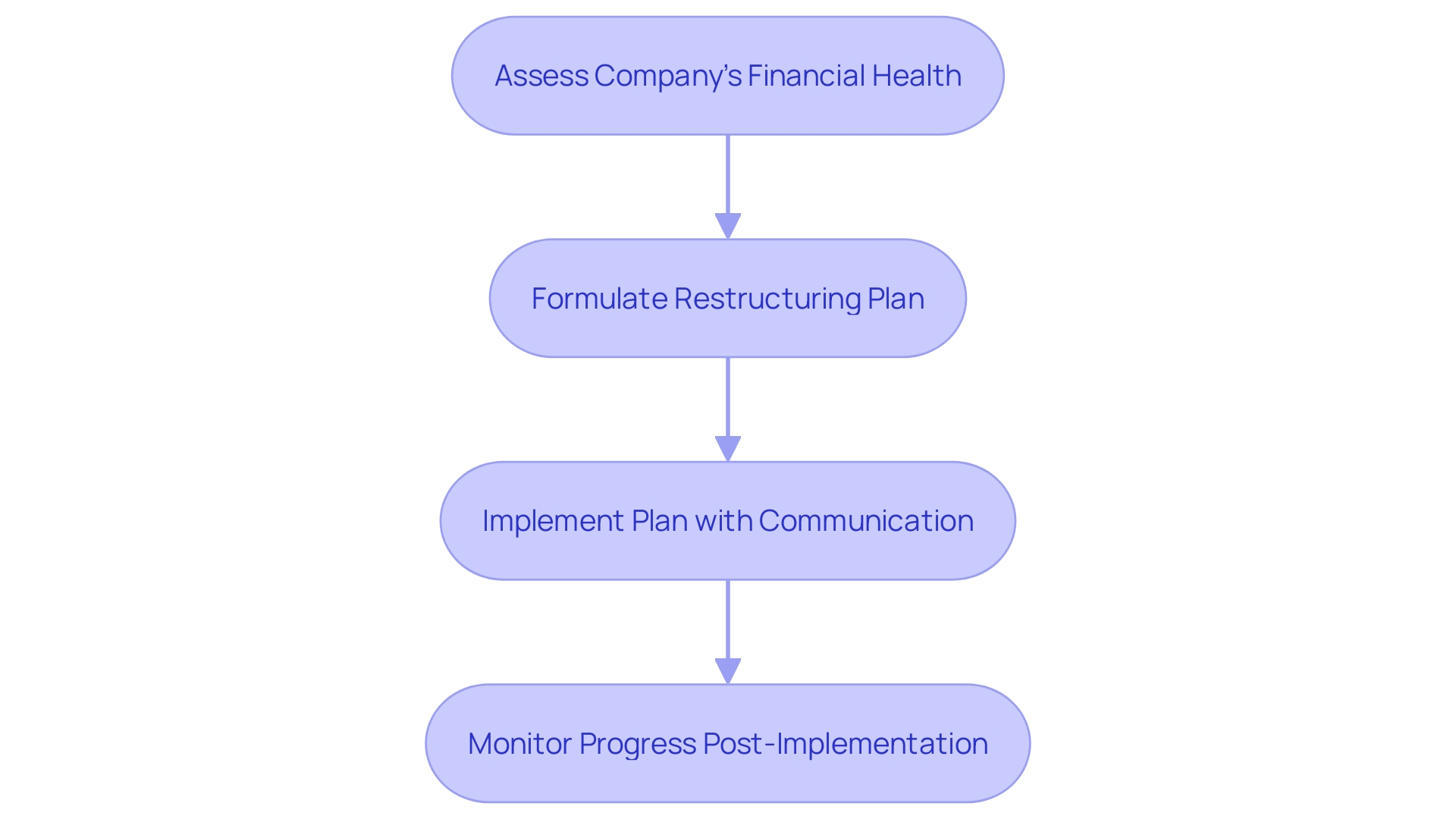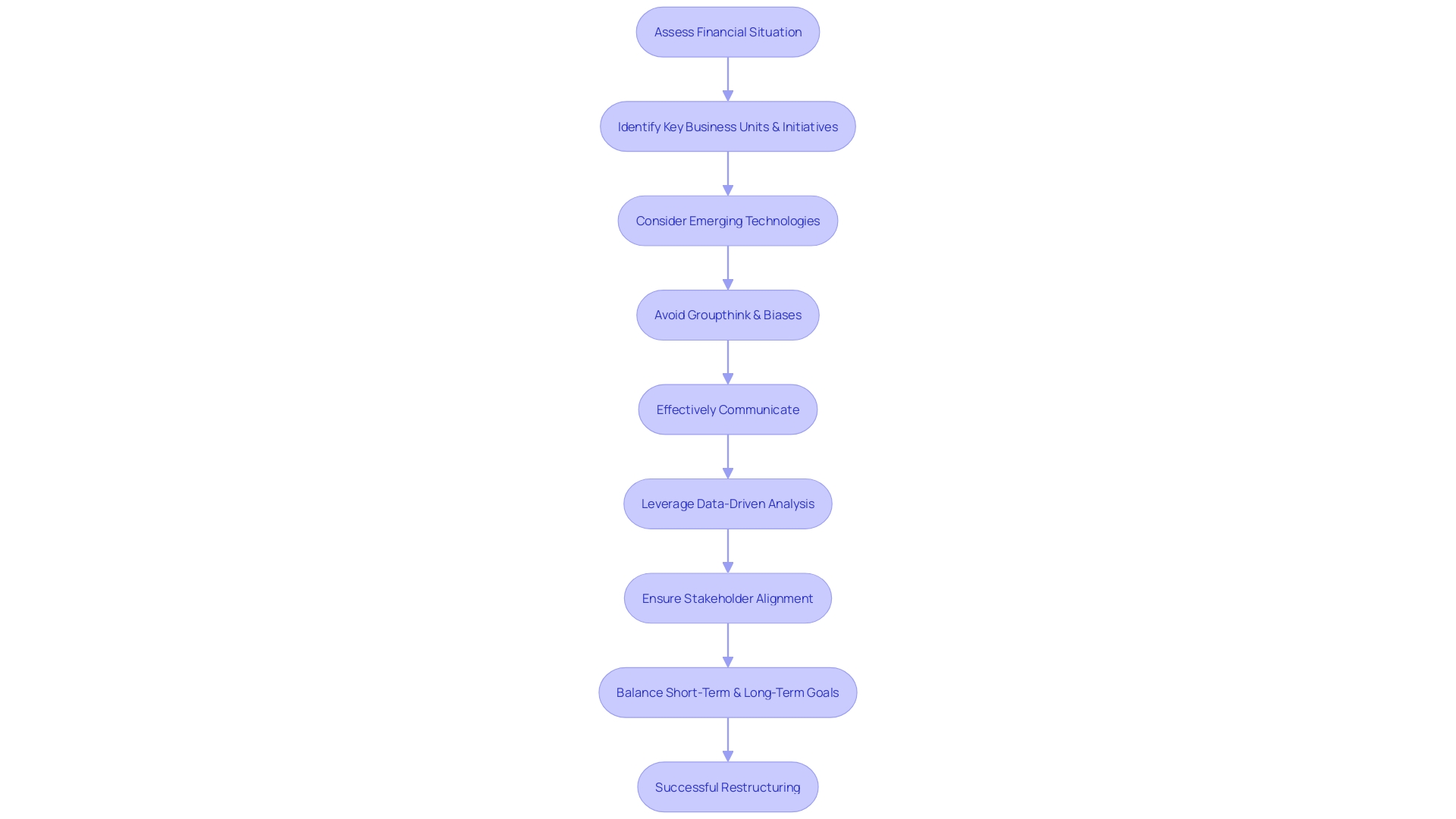Introduction
Corporate restructuring is a complex process that companies undergo to modify their financial or operational structure during times of stress or significant change. There are various types of restructuring, including financial, operational, and strategic, each tailored to address specific challenges and goals. In today's rapidly evolving market, engaging with top restructuring consulting firms and advisors is crucial for companies to navigate complex situations and emerge stronger.
Planning and executing a restructuring strategy require rigorous analysis, a clear understanding of the business's strengths, and a proactive approach. With the guidance of seasoned restructuring advisors, companies can make informed decisions, manage risks effectively, and set a course for renewed growth and stability. In this article, we explore the role of restructuring advisors, key considerations in choosing them, the expertise required for effective restructuring, successful case studies, steps in the restructuring process, cost and employee considerations, latest trends and economic impacts, the benefits of finance consulting, and best practices for boardroom decision-making.
By delving into these topics, we aim to provide practical advice and solutions to the CFO audience, empowering them to navigate the challenging landscape of corporate restructuring confidently.
Types of Corporate Restructuring
Corporate restructuring is a multifaceted process that companies undertake to significantly modify their financial or operational structure, typically during times of stress or significant change. There are several types of restructuring that companies may consider, each tailored to address specific challenges and strategic goals. Financial restructuring often involves the reorganization of a company's capital structure to stabilize finances, as seen in the example of Fresenius Medical Care which grew substantially through acquisitions and organic growth. Operational restructuring looks at improving business efficiency and workflows, much like TBC Bank's agile transformation which aimed to reduce complexity and accelerate digital product time-to-market. Strategic restructuring, on the other hand, can involve pivoting a company's business model or strategy, similar to Bird and Spin's focus on affordable, environmentally friendly transportation solutions to stay ahead in the dynamic micromobility market.
The rapidly evolving market and unpredictable economic conditions, underscored by the recent peak in company insolvencies, highlight the significance of engaging with top restructuring consulting firms and advisors. These experts provide invaluable guidance, equipped with the knowledge and experience to navigate complex situations, such as those experienced by Intel, which is considering divesting parts of its business to focus on core competencies.
In the current M&A climate, as the BCG’s M&A Sentiment Index suggests, decision-makers are cautiously evaluating their readiness for mergers, acquisitions, and divestitures. Consulting with restructuring professionals, who bring a wealth of expertise to the table, is a strategic step for companies aiming to realign their operations with the market's demands and to emerge from restructuring stronger and more competitive.
Planning and executing a restructuring strategy is no small feat. It requires rigorous analysis, a clear understanding of the business’s strengths, and a proactive approach to adapt to the changing business landscape. With the guidance of seasoned restructuring advisors, companies can make informed decisions, manage risks effectively, and set a course for renewed growth and stability.
The Role of Restructuring Advisors
Financial restructuring advisors are essential in steering organizations through financial turbulence. They bring to the table a wealth of expertise in financial scrutiny, strategic development, and stakeholder negotiations. For instance, consider the case of Strategic Solution Partners (SSP), a market leader in operational problem-solving within the hospitality sector. They specialize in strategic planning and revenue enhancement, tailoring their approach to meet the unique needs of each client. Similarly, the transformation of Cisler Sweets, a beloved confectionery brand, involved a comprehensive review of financial health, leading to the revival of cherished traditions and childhood memories attached to their products.
Moreover, a financial analyst's role, as demonstrated in the restructuring of Pacific Steel, is pivotal. Pacific Steel's restructuring involved an in-depth analysis of insurance claims and a move towards reference-based pricing, which was orchestrated with the help of USI Insurance Services. This strategic decision was based on meticulous data analysis and financial forecasting, which are cornerstone responsibilities of a financial analyst. These analysts play a vital role in predicting future financial performance using historical data, statistical tools, and financial modeling.
The evolving economic landscape, highlighted by the U.S. economy's inflection point and the search for leaders adept in navigating high-inflation, high-interest rate environments, underscores the importance of restructuring advisors. They are the architects of strategies that ensure companies not only survive but thrive by making calculated investments, divestments, and technological enhancements to improve efficiency.
The insights from financial analysts and restructuring advisors can significantly influence a company's reputation, making it more attractive to customers, partners, and employees. As businesses prepare for sustained economic recovery, the contributions of these advisors become even more critical. They are the guiding forces that help businesses make informed, bold decisions rather than retreating in fear, as expressed by industry experts. Supporting this, statistics reveal the increasing number of company insolvencies, emphasizing the demand for proficient financial analysis and strategic planning to navigate these challenging times.

Key Considerations in Choosing Restructuring Advisors
When exploring restructuring advisory firms for corporate financial solutions, it is essential to delve beyond surface-level attributes and understand the depth and breadth of expertise that top-tier firms provide. For instance, Bain & Company's global reach across 65 cities in 40 countries showcases not only their expansive presence but also their commitment to working cohesively with clients to deliver outstanding results and redefine industries. This integrated expertise, coupled with a vibrant digital innovation ecosystem, ensures that solutions are not only tailored but also forward-thinking and sustainable.
Similarly, the case of IBL Group, operating in over 23 countries with a focus on a variety of sectors, highlights the importance of a firm's ability to adapt to industry-specific challenges and their innovation-driven culture. This adaptability is key when companies face unprecedented events such as pandemics and economic fluctuations.
Firms that have a documented track record of success, such as those with high EcoVadis ratings for adherence to social and ethical standards, demonstrate a commitment to excellence that can be pivotal for businesses in need of restructuring services. Furthermore, the ability to create strategic budgets and navigate financial complexities is crucial. This is exemplified by the eight-step strategic budgeting process for distressed companies, which underscores the significance of practical advice and proficient financial management.
The value of key personnel in an organization, as discussed by financial experts, cannot be overstated. Their influence on the company's value, whether through revenue growth or operational efficiency, is a critical factor to consider when selecting a restructuring advisor. A firm's ability to assess and value key players is indicative of their understanding of the nuanced impacts personnel have on a business's health and prospects.
In light of ongoing changes in the capital markets, such as the resurgence of the COO role and industry-specific shifts like the UK's nuclear power expansion, it is clear that companies need advisors who are not only abreast of the latest developments but can also provide guidance that aligns with the evolving economic landscape.
The collective insights from case studies, expert quotes, and industry statistics emphasize the necessity for companies to partner with restructuring firms that offer a comprehensive and dynamic approach to addressing their unique financial and operational challenges. It is this multi-faceted expertise and cultural alignment that will pave the way for businesses to achieve stability and growth in challenging times.

Expertise Required for Effective Restructuring
Restructuring an organization is a multifaceted endeavor that demands proficiency in various domains to ensure a company's financial well-being and strategic direction. It requires more than a thorough understanding of financial statements; it necessitates a holistic approach that encompasses operational efficiency and strategic foresight.
Key to this process is a financial analyst's ability to dissect financial data and market trends. They must be adept at diving into balance sheets, income statements, and cash flow statements to evaluate a company’s profitability, liquidity, and solvency. Their forecasting skills are critical—they use historical data, statistical tools, and financial modeling to project sales, revenue, expenses, and earnings.
Moreover, their role extends to offering investment advice by evaluating potential returns and risks, analyzing securities, and making buy, hold, or sell recommendations. This expertise is essential for creating a solid foundation that supports all subsequent restructuring efforts.
In the context of strategy, financial analysts play a pivotal role in shaping the future trajectory of a business. By forecasting future revenues and expenses, they enable more effective budget and investment planning. Their analysis of financial statements unearths trends and potential risks, ensuring that financial practices are sustainable and aligned with the company's strategic goals.
However, the scope of restructuring extends beyond financial analysis. As highlighted in case studies like TBC Bank's agile transformation, reducing organizational complexity is crucial for growth. Similarly, AT&T's history demonstrates how systems and policies can become entrenched over time, necessitating a proactive approach to organizational change.
In such transformations, stakeholder management becomes a key skill. Advisors must navigate the intricate web of interests and expectations, ensuring that all parties, from employees to executives, are aligned with the restructuring goals.
As Chris Festog, the Senior Executive Vice President and Chief Financial Officer of Mutual of America Financial Group, puts it, building a 'learning' financial team is imperative. Such a team delves deep to understand the business, fostering accurate reporting and analysis that underpin effective decision-making.
In summary, a restructuring advisor’s toolbox should be filled with a range of competencies—from financial forecasting and investment advice to operational optimization and stakeholder management. These skills, coupled with an action-oriented approach, are the bedrock of successful corporate restructuring initiatives.

Case Study: Successful Restructuring with Advisor Support
In the dynamic landscape of corporate financial solutions, a compelling case study has surfaced involving the strategic restructuring of a company that faced imminent threats. This case study delves into the complexity of a company grappling with the uncertainties of catastrophic wildfire risks, akin to the challenges faced by California's utilities in recent decades. Here, the chosen restructuring advisors played a pivotal role, employing a multifaceted approach that mirrors the intricacies of balancing safety measures with economic trade-offs, much like the safety standards associated with wildfire risk mitigation.
The advisors approached the problem with a nuanced strategy, echoing the insights of Gofaizen & Sherle, a consultancy firm that has carved out a name for itself by offering tailored business and financial solutions. Their work extends across company registration, accountancy, and business strategy development, which aligns with the comprehensive solutions required for successful corporate restructuring.
Furthermore, the advisors took a page out of Nets' playbook, a veteran in the digital payment solutions arena, known for its innovative approach to presenting technical data in engaging, user-friendly formats. This ingenuity was instrumental in reorganizing the company's financial data, ensuring transparency and ease of understanding for stakeholders involved.
The case study also draws parallels with the AI industry's evolving landscape, highlighting the importance of continuous adaptation and the recognition of both risks and opportunities. The restructuring strategy reflected an understanding that, similar to frontier AI labs, companies must navigate a rapidly changing environment with growing challenges.
To encapsulate the advisors' methodical approach, one of the quotes from the restructuring process stands out: 'Develop a transition plan with details early. Rather than just winging it, you need to document a clearly defined sequence of meetings, decisions, and communications, reflecting your priority areas, to make the transition as smooth and transparent as reasonably possible.' This quote underscores the deliberate and planned nature of the restructuring process.
The outcome of this strategic overhaul is a testament to the efficacy of the advisors' approach, with the company not only stabilizing but also positioning itself for future growth. The case study serves as an instructive example for companies seeking to navigate similar turbulent financial waters, emphasizing the crucial role of skilled advisors and the value of a meticulously crafted restructuring plan.
Steps in the Restructuring Process
Corporate restructuring is akin to a strategic overhaul of a company's core operations and organizational structure, aiming to address inefficiencies, streamline costs, and reorient its business direction. Notably, the restructuring strategy should commence with an exhaustive assessment of the company's financial health. Amidst this phase, it's crucial to decipher the financial data in an accessible manner, much like the approach of Nets in transforming complex tables and schemes into user-friendly formats, thereby fostering a deeper engagement with the information at hand.
Following the initial assessment, formulating the restructuring plan is the next critical step. It should be comprehensive, touching on all facets—financial, strategic, and legal. A multi-dimensional analysis which includes financial performance, risk evaluation, market potential, and an audit of management quality is indispensable. This was exemplified by the meticulous restructuring approach of Rite Aid Corporation, which embarked on a transformative journey to revamp its business model and reduce its debt, thereby enhancing operational flexibility.
The implementation phase demands precision and adaptability, and it's during this time that open and transparent communication becomes pivotal. As highlighted by a McKinsey Global Survey, restructuring can lead to workforce distraction and growth initiatives stalling. Therefore, a clear communication strategy that keeps all stakeholders informed is non-negotiable, mirroring the practices of leading firms like Boston Consulting Group, which champions collaboration and stakeholder empowerment.
Finally, monitoring the progress post-implementation ensures the restructuring efforts align with the envisaged goals. This is not merely a financial exercise but one that also considers the human element, as Joan Beets insightfully notes, restructuring can induce workforce stress and anxiety. Acknowledging and managing these emotional impacts is as crucial as the quantitative outcomes.
As we look at companies like Bird Global, Inc. entering restructuring to position for sustainable growth, or the forward-looking statements of companies undergoing transformations, it's evident that restructuring is more than a fiscal recalibration—it's a comprehensive strategy that, if conducted with foresight and empathy, can lead to revitalized businesses ready to tackle future challenges.

Cost and Employee Considerations
When considering a corporate restructuring, it’s crucial to weigh the financial implications alongside the potential impact on the workforce. Restructuring, while aimed at enhancing efficiency and reducing costs, often leads to significant shifts in a company's operational and organizational structure. It can introduce uncertainty regarding job security, role changes, and even shifts in work culture, potentially causing stress and anxiety among employees.
A McKinsey Global Survey highlighted that during restructuring, 38% of employees reported being distracted from their day-to-day activities, and growth initiatives often stalled. Successful reorganizations, noted by 66% of respondents, were those with a clear communication plan for both internal and external stakeholders. Proactive communication is critical, allowing employees to understand the reasons behind restructuring and what outcomes to expect.
The headcount planning process is a fundamental aspect of restructuring. It requires collaboration across departments and focuses on aligning the talent within the organization with the company's future growth needs. Planning should be methodical, addressing the challenges the company aims to resolve and the goals it intends to achieve.
Amidst these changes, major companies have had to make difficult decisions. For example, SAP's restructuring plan, aiming for faster revenue growth, is anticipated to affect over 7% of its workforce. The company has revised its operating profit outlook, balancing cost-saving measures against investments in its employees and technology.
It’s clear that the human element of restructuring cannot be overlooked. As one cost consultancy leader put it, delivering value extends beyond savings, and investing in people, tools, and technology can drive transformative change. In difficult times, showing appreciation for employees and providing adequate support, such as enhanced severance packages or improved benefits, can make a significant difference in maintaining a committed and resilient workforce.

Latest Trends and Economic Impacts
Digital transformation and global economic shifts are reshaping the restructuring landscape, demanding agility from businesses across sectors. A Chilean retail giant, despite its dominance in the market, faced talent retention challenges amidst rapid expansion. The retailer's necessity to establish a dedicated Talent area underscores the importance of aligning human resources with technological growth to maintain a competitive edge. Similarly, Travel Charme Hotels & Resorts exemplifies how embracing technology enhances operational efficiency. The story of the Travel Charme Strandhotel Bansin reveals the profound impact digital tools can have on guest experience in the hospitality industry.
Moreover, the restructuring process isn't immune to the influence of global market forces. Central banks' shift from historically low interest rates signifies the end of the era of abnormally high returns for stocks and bonds, as noted by Bank of America. This change prompts CFOs to reconsider investment strategies and underscores the need for adaptable restructuring plans. Additionally, Malaysia's emergence as a manufacturing hub for critical goods, due to supply chain diversification, highlights the global dynamics affecting restructuring prospects.
Executive chairman Steffen Meister encapsulates the transformational power of AI and other technologies on the economy, indicating the vast potential for businesses to innovate. Meanwhile, the complex interplay of M&A activities, cross-border expansions, and the redistribution of investments points to a future where companies must navigate reglobalization with strategic finesse, as emphasized by experts who advocate for exhaustive scenario planning.
In the face of these trends, digital transformation is no longer a luxury but a necessity. Statistics show that investments in AI, AR/VR, IoT, and other emerging technologies are on the rise, propelled by the need to adapt to a post-pandemic business environment. The digital economy encompasses not only ICT infrastructure but also e-commerce and priced digital services, all of which are integral to business success in the contemporary market.
As these factors converge, CFOs are called to steer their organizations through a fluid landscape, balancing innovation with risk management, to ensure not just survival but thriving success in an evolving business world.

Benefits of Finance Consulting in Restructuring
At the heart of every successful corporate restructuring lies the acumen of skilled finance consultants, whose expertise in financial analysis, forecasting, and risk assessment is pivotal. Delving into financial statements and market trends, these professionals equip businesses with the critical insights necessary to navigate complex financial landscapes and seize investment opportunities. The role of a financial analyst, for instance, extends beyond mere data scrutiny. They employ statistical tools and financial modeling to predict future financial performance, offering investment advice that balances potential returns with associated risks.
In the realm of small business consulting, an independent consultant acts as a strategic coach, providing industry-leading advice on a range of topics from sales strategies to financial management. These services not only bolster a business's brand but also streamline operations, offering tailored coaching and access to the latest market research. For example, one case study highlighted a restaurant's increased sales by leveraging its central location and understanding the market, thereby demonstrating the significant impact of strategic consulting.
Current news underscores the urgency for financial leadership adept in navigating today's high-inflation, high-interest rate environment—a stark contrast to the era of easy money most executives are accustomed to. With such economic unpredictability, the demand for financial consultants capable of guiding institutions through these challenges is surging. As evidenced by Virtusa Corporation's approach, which integrates digital engineering with execution-focused consulting, the results speak for themselves: improved quality, lower costs, and impactful outcomes.
A recent report sheds light on the effectiveness of consulting firms in today's financially strained climate, revealing a 56% increase in financial performance improvement engagements. Clients seeking these services typically aim to enhance revenue and reduce costs, with over half reporting improved efficiency and performance. As companies face the dual pressures of inflation and staffing shortages, the role of finance consulting in developing corporate financial solutions becomes ever more critical.
Best Practices for Boardroom Decision-Making
The dynamic nature of the digital age has ushered in a new era of restructuring, where boardroom decisions are crucial for navigating corporate financial challenges. Successful boardrooms, like those at Nets and M&T Bank, understand the importance of turning complex data into comprehensible strategic insights. For instance, Nets, with its half-century legacy, had to innovate ways to make technical data accessible for stakeholders, ensuring informed decision-making. Similarly, M&T Bank, with its deep-rooted history, faced the need to establish Clean Code standards amidst the digital revolution to maintain software quality and compliance in the highly regulated banking sector.
Effective restructuring decisions are supported by a multi-faceted approach. Boards must be forward-thinking, weighing the immediate effects against long-term strategic goals. This involves a clear assessment of the financial situation and identifying key business units and initiatives that align with the company's overarching strategy. For instance, aligning with just 10 to 30 essential initiatives can focus efforts and improve outcomes.
Moreover, contemporary trends, such as the Norges Bank Investment Fund's integration of responsible AI, highlight the need for boards to adapt to emerging technologies. With tech giants like Microsoft and Apple in its portfolio, the fund's 12.5% growth evidences the significant impact of tech and AI on modern governance.
However, boards must watch out for the pitfalls of groupthink and biases that hinder innovation and strategic planning. As noted in insights from McKinsey and nonprofit board reforms, pursuing bold investments and debiasing are vital for robust decision-making.
In summary, boards that effectively communicate, leverage data-driven analysis, ensure stakeholder alignment, and balance the short-term with the long-term will be the architects of successful restructuring. As evidenced by industry leaders and global investment trends, those who embrace these best practices will likely emerge stronger in the competitive corporate landscape.

Conclusion
Corporate restructuring is a complex process that helps companies modify their financial or operational structure during times of stress or significant change. Engaging with top restructuring consulting firms and advisors is crucial for companies to navigate these challenges and emerge stronger in today's rapidly evolving market.
Restructuring advisors play a pivotal role in guiding organizations through financial turbulence. They bring expertise in financial scrutiny, strategic development, and stakeholder negotiations. Choosing the right advisors is crucial, considering their expertise, global reach, adaptability, and commitment to excellence.
Effective restructuring requires expertise in financial analysis, forecasting, operational optimization, and stakeholder management. Financial analysts play a crucial role in assessing financial data, offering investment advice, and shaping a company's future trajectory. Successful case studies highlight the importance of reducing complexity and embracing organizational change.
The restructuring process involves assessing financial health, formulating a comprehensive plan, implementing it precisely, and monitoring progress. Clear and transparent communication is essential to minimize workforce distraction and ensure stakeholder alignment. The human element must be considered, acknowledging and managing the emotional impacts on employees.
Digital transformation and global economic shifts are reshaping the restructuring landscape, demanding agility from businesses. Skilled finance consultants provide critical insights to navigate complex financial landscapes and develop corporate financial solutions. Effective boardroom decision-making is crucial, embracing best practices such as turning complex data into actionable insights, being forward-thinking, and adapting to emerging technologies.
In conclusion, corporate restructuring requires expertise, careful planning, and proactive decision-making. By partnering with experienced advisors, companies can make informed decisions, manage risks effectively, and set a course for renewed growth and stability. It is through a comprehensive approach, embracing emerging technologies, and implementing best practices that companies can emerge stronger in the evolving business world.




